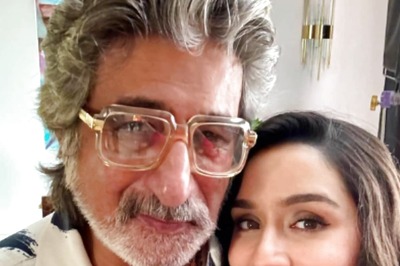
views
“I used to punish the men in my department who had problems with alcohol. But after becoming friends with AA, I started feeling bad for them. It is of utmost importance that we accept them and help them overcome the addiction,” said S T Ramesh, in-charge, DG & IGP, State Police, at an event organsied to announce the 47th anniversary of Alcoholics Anonymous.Alcoholism is a battle that most people live with. While some are ready to accept it, the rest are in denial and would rather live in the closet than come clean about it. Alcoholics Anonymous (AA) is a programme that ‘helps people who want to help themselves’. Alcoholics Anonymous is a fellowship of people that share their experience, strength and hope with each other that they may solve their common problem — alcoholism. There are no dues or fees, and they say the only requirement for membership is a desire to stop drinking. City Express talks to some people from the fellowship who have successfully kicked the habit.As a young teenager, Megan (name changed) would give her mother company when she would drink a peg or two. What started for the sake of company, soon turned into an addiction. “Initially alcohol would momentarily take away all my problems, or at least I felt so. Drinking was fun to begin with. However from fun, it became a combination of fun and problems and then just a problem.”For Megan drinking became an escape route, but the situation began getting out of control before she knew it. “I became very unpredictable once I started drinking. My friends would ask me to stop, but I never listened,” she recounts. Things began taking a turn for the worse as the addiction became stronger. “My life was a mess. I could not hold on to a job and eventually I hit rock bottom. That’s when I decided to quit. So I joined Alcoholics Anonymous,” she said.Today it has been 13 years since she has been sober. Now she helps people who suffer from alcoholism. Nishant (name changed), an event manager discovered alcohol when he was all of 15. A combination of peer pressure and emotional baggage drew him towards the intoxicating substance. Unlike Megan, Nishant was never out of control after his fair share of drinks. In fact he hardly ever got high. “People would ask me why I would want to quit. But I knew that for me, the glass could never be empty,” he said. He has been clean for the two years. “I can today admit, that yes I did have a problem with alcohol, though a few years ago I wouldn’t have been able to,” he added.Acceptance, is the most important stage when it comes to overcoming an addiction. According to Nishant, people who are addicted to substances usually find it hard to get along with others. “They have high levels of pride and are under the impression that they are possibly the most intellectual souls. Unfortunately that is not always the case. Fellow members of AA go through a process of 12 steps that help them overcome the need for the substance,” he explained. The process of quitting is through a number of meetings were people with similar addictions share their stories and overcome their need to use the substance. “In a way the process can be called a spiritual healing. You are literally picked up from rock bottom and made to realise that life is beautiful and that one does not need a particular substance to feel good,” he added.Padma, a housewife in her mid fifties was an alcoholic. After a series of midlife crises and emotional stress, she reverted to alcohol. She never touched alcohol until she hit rock bottom. After an extremely stressful episode, she decided to have her first drink. Unfortunately, alcohol was not her only companion, she began using pharmaceutical drugs as well. A concoction of the two led her to multiple visits to the rehabilitation centre and hospitals. “When I realised I had a problem, I visited a doctor who advised Narcotics Anonymous to me. I was under the impression that if I quit the medicines, I can still drink. But I was wrong. There came a point when I became delusional. I started hallucinating as well,” she said. What pulled Padma out of her situation were her children. “My kids recognised the problem and one of them even accompanied me to one of the AA meetings,” she added. Support from friends and family is crucial when one attempts to kick the addiction, without the required encourage, the process becomes that much harder for the addict.AA is celebrating their 47th anniversary at St Joseph’s Boys High School on June 26 at 10 am.




















Comments
0 comment